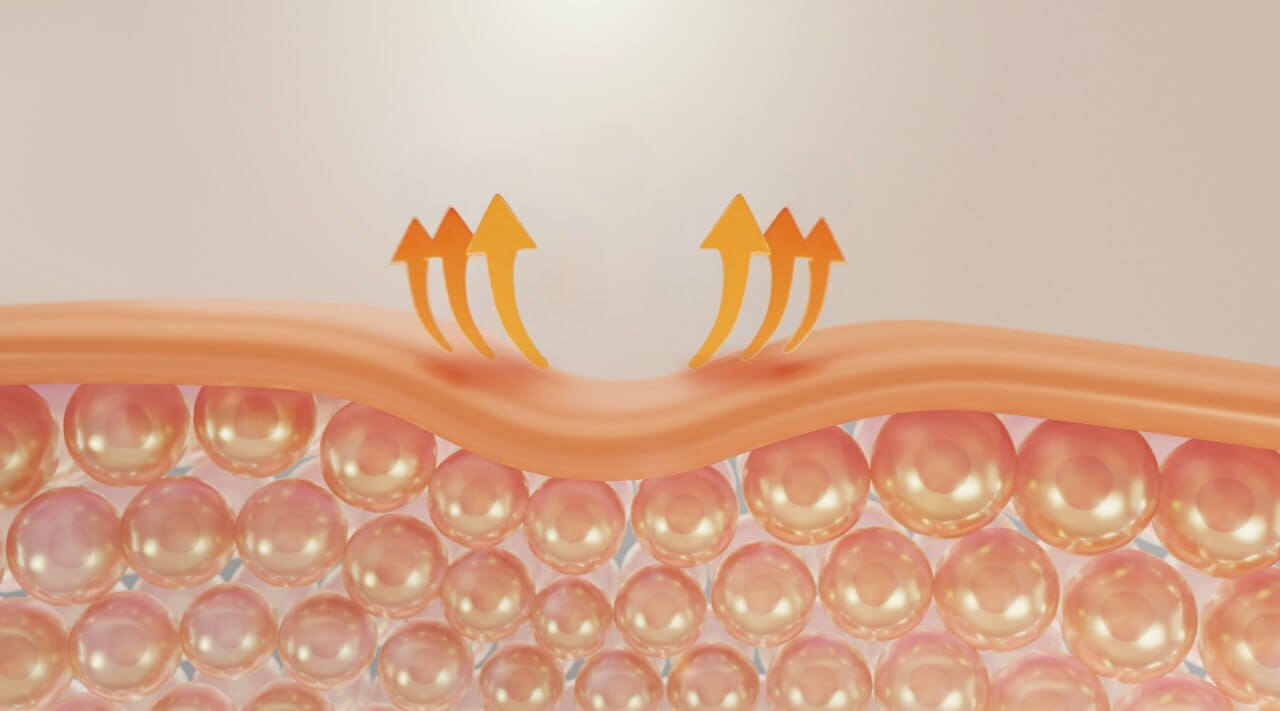UNIQUE CZECH CREAMS WITH BIOACTIVE ENZYMES
Patented formula since 2009
Patented formula since 2009

An enzyme is a specific organic molecule that accelerates reactions in organisms (acting as a biocatalyst). This allows reactions to occur even at relatively low temperatures, neutral pH, and atmospheric pressure, which are common in organisms.
In biological systems, many different types of reactions occur. When attempting to replicate these reactions outside of a living system (i.e., in vitro), it has been observed that their speed is significantly lower. Reactions in vivo occur hundreds to millions of times faster than the same reactions in vitro. This is mainly due to the existence of specific catalysts — enzymes. Enzymes often enable reactions that would otherwise hardly occur under the conditions of the human body (temperature, pH, etc.).
A catalyst is a substance that increases the speed of a chemical reaction without changing the chemical equilibrium (it only shortens the time to reach equilibrium). During reactions, enzyme molecules are not consumed.

The bioactive composite Vermione has excellent penetration through the skin into the subcutaneous tissue and cells. This penetration is primarily caused by the strong blood circulation in the treated area, which accelerates absorption.
Blood circulation is stimulated by the active substances in the bioactive composite Vermione, which are released from the complex of substances during reactions with the skin. After overcoming the upper skin layer, composed of dead cells, increased flow in the capillaries occurs, leading to a reaction with the bioactive complex.
During the release of the complex of substances, an enzyme known as Hyaluronidase is released into the tissue.
Hyaluronidase is an enzyme from the glycosidase (hydrolase) class that breaks down hyaluronic acid, which is part of the basic intercellular substance. This accelerates the absorption of active ingredients and their penetration into tissues, including inflamed tissues, and also facilitates the passage of active substances through the blood-brain barrier.
Hyaluronidase significantly increases diffusion, thus enhancing the absorption of liquid active ingredients contained in the bioactive complex Vermione.
The enzymes penetrate into the deepest layer of the skin and activate upon contact with skin tissue. They supply the skin tissue with essential vitamins and strengthen its immunity.

An enzyme is a simple or complex protein, and one of its most important functions is accelerating processes in the human body, specifically in cells. Enzymes play an indispensable role in the human body, which is why their use, for example in cosmetics, yields excellent results.

Enzymes are known for pushing damaged and dead cells towards the surface of the skin, which is usually clear evidence of the positive and regenerative effects of enzyme action.

The Vermione product and its production technology are entirely new in that a complex of highly effective substances was created, which under normal conditions react very quickly, and the original active substances degrade within 24 hours at standard temperatures. In the case of the Vermione bioactive extract obtained from Californian worms, a unique patented technology was developed that stabilized these substances, even at temperatures above 50°C. The extract has a very high absorbability even on undamaged skin, breaking down dead skin cells without harming healthy ones — in fact, it nourishes them.
Clinical studies conducted at the PROSANUM sanatorium, under the leadership of Professor MUDr. František Novotný, DrSc, demonstrated the high efficacy of treatment for psoriasis, eczema, acne, cold sores, skin lesions, pigment spots, scar tissue, burns, non-healing and infected wounds (diabetic ulcers, venous ulcers), swelling, hematomas, and, notably, poorly healing postpartum defects and HPV infections. In recent years, the Vermione bioactive extract has been successfully used in treating hemorrhoids, where it has been proven to be as effective as surgery. This extract offers an even broader range of applications, which future research and studies may reveal.
Other active ingredients in Vermione creams have their specific effects on the body. The complex of essential amino acids in the right combination initiates the hyperfunction of endocrine glands, especially the pituitary gland, which is catalytically stimulated to produce increased amounts of neurohormones, particularly endorphins.
These neurohormones act on the central nervous system (CNS), serving as a natural tonic, which explains the noticeable calming effect, as well as the elimination of depressive states, insomnia, fatigue, etc. Simultaneously, the products of the pituitary gland regulate the energy system of the entire organism through the neurohumoral system, ensuring that enzymes balance the energy potentials in the primary organs that govern the body as a whole.
This effect is comparable to internal reflexotherapy and brings harmonizing effects to the functions of internal organs. It explains the extract’s impact on stabilizing blood pressure, improving blood count, increasing muscle tone, and enhancing short-term memory. Similarly, oligopeptide complexes trigger increased thymus function, which produces T-lymphocytes, and the spleen, which supplies B-lymphocytes to the blood—both critical components of the body’s immune system. This factor is crucial in the relatively rapid increase in the immune response of skin tissues.
Another component of Vermione creams produced during the biotechnological preparation of the base material is phospholipids, which, in their classification among immunogenic substances and corresponding preparations, belong to the group of surface-active agents with membrane-toxic effects. The membrane toxicity of this phospholipid conglomerate involves blocking the lipoprotein channels (receptors) of cells, thus preventing their nutrition and oxygen supply.
This immune reaction occurs similarly to bacterial, viral, or other infections attacking damaged cells, leading to their demise. The polypeptide component falls into the group of substances that elicit an immune response. The supply of such modified proteins acceptable to the organism triggers antigen formation, acting as a defense system against the body’s pathology. Furthermore, the use of Vermione has been shown to increase the presence of lysozyme in the blood, which suggests that the oligopeptides, together with other products in Vermione, serve as essential precursors for the formation of this “nonspecific antibiotic,” initiating its production, which enhances the body’s immune response against external threats.
Organically bonded Fe++ (iron) created through the breakdown of porphyrin chains into pyrrole nuclei and the Fe++ cation strengthens the blood pool between the bone marrow and spleen, thereby improving hematopoiesis. Low-molecular-weight polypeptides enhance the regenerative capacity of the cellular system, manifesting in significantly accelerated healing of injuries and post-surgical conditions. The functions and effectiveness of enzymes, glycoproteins, and other substances in the Vermione extract have already been extensively documented in numerous scientific papers and studies.
Vermione also contains several substances, including enzymes, antibiotics, and hormones, which have not yet been fully identified but are believed to have significant synergistic effects. All these factors give the Vermione extract its characteristic polyvalent nature, meaning it has a broad spectrum of effects depending on the organism’s condition.
This explains the variety of outcomes when using the product, with its most notable effects being harmonizing and preventive, as it restores the body and enhances its overall immunity. One undisputed advantage of long-term use is its excellent tolerance, nontoxicity, immunomodulatory efficiency, and regulatory properties, all of which contribute to the improvement of the organism’s overall condition, both psychologically and physically.
© 2024 - Vermione. All rights reserved.